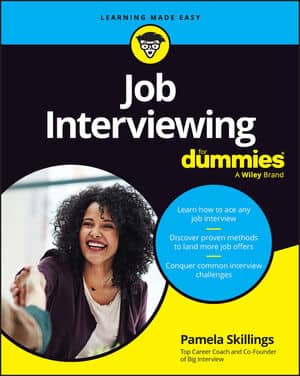A job recruiter (or headhunter) is an intermediary between the employer and you, who interviews people to fill positions with the best available candidates. Internal recruiters work inside the company, either as regular employees, or as contract employees. Third-party recruiters or independent recruiters are external recruiters, some of whom are employed as retained recruiters on an ongoing basis, while most are employed on a transaction basis as contingency recruiters.
Recruiter courtesy interview
Retained recruiters get paid whether or not the recruiter matches a candidate to a position. They might run the other way to avoid seeing job seekers who come unbidden to their offices. (Time is money.) But you may know someone who is a client or friend of a retained recruiter who can get you through the door with a courtesy interview.
Unless your interviewer is recruiting for a position that’s perfect for you (which is very unlikely), focus on providing the recruiter with information that may qualify you for a future search. Some rules to follow:
Always give the recruiter a current resume.
Get straight to the point; don’t take more than 20 minutes of the recruiter’s time.
Explain your experience, achievements, and skills.
Thank the recruiter for time invested in you.
Don’t play the role of a coy, amateur job seeker. The retained recruiter is doing you a favor. You wouldn’t ask for a courtesy interview if you didn’t need a job. Your conciseness and ability to communicate efficiently count. Review your resume and get to the point.
Recruiter general screening interview
Contingency recruiters, unlike retained recruiters, get paid only when they match up a candidate with a position. The more people they see, the larger their candidate pool from which to fill employers’ job orders. Getting an interview with a contingency recruiter or employment agency consultant is easier than with a retained recruiter.
This doesn’t mean you can waste a contingency recruiter’s time. Hand over your resume and give your best performance to show a broad selection of work experiences. You’re trying to make the contingency recruiter remember you for a variety of future job openings.
Make sure that you get high scores in the following qualities:
Personality/likability
Adept communication
Enthusiasm and motivated interest in work
Leadership and initiative
Competence in skills and knowledge
Experience (some job history)
Recruiter search interview
A recruiter may contact you about a specific job opening. Chances are that you’ve done or are doing a job similar to the one the client wants to fill, and that’s why the recruiter called you. So you already know the basics of your industry, even though at first you might not know who the client is.
If you’ve been so busy doing your job that you’re not up to date on industry trends, there’s no time like the present for a cram review. Third-party executive and technical recruiters can’t hire you, but you’ve got to get past them to see their clients.
To impress a recruiter in a search interview:
Show that you have definite career goals and indicate how this position fits those goals.
Ask probing, thoughtful questions about the company and position, showing you’ve done your homework.
Use the Internet to research recruiting firms that specialize in your industry or occupation.

